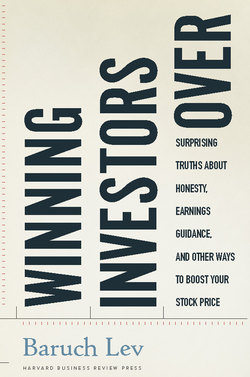Читать книгу Winning Investors Over - Baruch Lev - Страница 41
На сайте Литреса книга снята с продажи.
Operating Instructions
ОглавлениеDON’T EVEN THINK ABOUT IT. When operations stall and the specter of falling stock prices, intervention by activist investors, defection by disgruntled employees holding useless options, and adverse actions by concerned customers and suppliers loom large, the temptation to manipulate financial information naturally arises. Being convinced, like most executives, that the slump is temporary, you may even think that you do shareholders a favor by “smoothing out” the downturn in the financials so they don’t worry their pretty heads about it.Consider that many business slowdowns are prolonged affairs exacerbating the fraud, and that the likelihood of being caught cheating is constantly increasing in the post–Sarbanes-Oxley environment, further enhanced by the 2010 Dodd-Frank legislation encouraging whistle-blowers to go directly to the SEC and obtain rich rewards.49 And, when caught, you are almost sure to lose your job. Remember, even if not detected, the act of manipulation, as I’ve shown abundantly, is costly and exacerbates the downturn. So, like the warning at the top of the no-parking signs in Manhattan: “Don’t even think about it.”
DON’T CLAM UP IN TOUGH TIMES. When the going gets tough, the natural tendency is to withdraw from the market. Stop earnings guidance, shorten conference calls, send substitutes to shareholders meetings, file financial reports late, and reduce voluntary disclosure.50 These reactions are not smart. There is absolutely nothing to be gained and much to lose from such market pullback. The evidence of companies in distress stopping quarterly guidance, for example, shows that stock prices drop sharply on the announcement of guidance cessation and analysts abandon the stoppers (see chapter 6). When performance stalls, shareholders—your principals—should be doubly engaged (see further details in chapters 6 through 8).
THE VIRTUES OF CONSERVATISM. When the business deteriorates, exercise extra care with insider trading (yours, and those of other top executives) and avoid aggressive accounting procedures, such as understating loan loss reserves or switching from accelerated to straight-line depreciation, to increase reported earnings. Both insider trading and accounting trickery attract the attention of regulatory agencies, trial lawyers, and perceptive investors and reporters. A case in point: a Wall Street Journal article with the headline, “Is AIG on Slippery Slope?” discussing analysts’ and investors’ concerns with AIG’s change of accounting technique amid continuing problems with its subprime-linked securities.51
AVOID ELEVATED EXPECTATIONS. Manipulation is often “forced” on managers by overly optimistic investor expectations and inflated stock prices that have to be justified by ever-higher revenues and earnings. You have to nip such heightened expectations and overpriced shares in the bud by releasing realistic information to investors. If you procrastinate, you won’t be able to safely dismount the price tiger; you will not survive the large price correction when investors finally realize it was all a dream. Chapter 5 deals with overvalued shares, their consequences, and how to avoid this predicament.
COME OUT WITH IT, QUICKLY. If you or your predecessors engaged in misrepresentation, come out fully and cleanly as soon as possible. Spin, gloss, or half-truths about the manipulation—such as Coca-Cola’s claim that the reversal of the gallon-pushing scheme was a planned move—are harmful to shareholders and ultimately to you. Don’t hide the truth, like the “stealth restatement,” which is changing previously reported earnings or sales without alerting investors to it. Glass Lewis & Co. reports that no less than 254 companies tried to hide their restatements from investors in 2006.52 And don’t delay the bad news. Research has shown that announcements of earnings restatements without numbers—postponing the grim magnitude of the restatement for later—trigger a sharper stock price decline than when all the details are disclosed at once.53 Remember that the truth will come out sooner or later, so get it over with quickly. Referring to Mark Twain writing The Adventures of Tom Sawyer, Huckleberry Finn said that “he told the truth mainly.” Just tell the truth.
